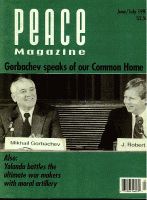
Peace Magazine Jun-Jul 1993, page 13. Some rights reserved.
Search for other articles by PMag staff here
The first term of the Non-Proliferation Treaty (NPT) expires at the end of March 1995. A conference will be held then to determine whether to extend it. A preparatory committee will begin its work in May. Until this year, the prospects looked gloomy. The non-nuclear nations have indicated in previous review conferences that they would demand compliance with the terms of the preamble, which calls for a Comprehensive Test Ban Treaty (CTB). The U.S. government remained opposed to such a treaty until earlier this year, when George Bush reluctantly signed a moratorium on nuclear testing. Congress had attached it to an Energy bill, which included funding for a supercollider that Bush wanted.
President Clinton has indicated his support for a CTB. Nevertheless, there are worrisome aspects to the situation. The moratorium that Congress passed allows for about fifteen more nuclear tests over a three year period, ending in 1996. Experts at the United Nations regard it as a mistake to end nuclear testing after the Non-Proliferation Treaty extension conference. Some non-nuclear countries are certain to insist on limiting the duration of any extension of the treaty to fixed periods, conditional on progress toward the test ban. A restriction of this kind can be done by resolution.
Worse yet, if the Americans resume testing in July, as planned, this will pressure the Russians, French, and Chinese to resume testing as well.
Canada wants the NPT to be extended, as do all Western powers. This gives the non-nuclear powers a certain amount of leverage, because they have the votes to determine the future of the NPT.
CTB expert William Epstein encourages everyone to bring pressure to bear to prevent the U.S. resumption of testing. For many Canadians, the strongest form influence is to call the Ministry of External Affairs and urge that they press these realities upon the Clinton administration. To do that hundreds of signatures are being collected on a petition with a picture of Bill Clinton playing his saxaphone and the caption 'Don't Blow It, Bill.'
By Bill Epstein
ARMX'93 came back this year under an assumed name: "Peacekeeping '93." On Tuesday, March 15th over 300 people from across Southern Ontario and Quebec joined together in Ottawa in spirited nonviolent civil disobedience.
From 11:00 a.m. to 3:00 p.m., entrances into the Congress Centre were blocked by breast feeding mothers, war veterans, members of such organizations as the Catholic Worker Movement, the Student Christian Movement, ACT for Disarmament, the Toronto Disarmament Network and the Ontario Public Interest Research Group, in a call for peace, an end to arms sales and an end to military intervention.
There were occasional moments when it seemed that either participants in ARMX '93 or the Ottawa police were eager to provoke violence. I was kneed in the groin, for example. Despite such provocation, the participants in the peaceful blockade did not respond in kind. Calls of "Shame" seemed to be the most common of verbal responses to insults and provocative incidents.
No doubt the protest had an impact on the activities of the provincially owned Congress Centre. One person, who was turned away, complained to an Ottawa police officer that he had lost over over $13 million in business.
The most distressing news however was the assault on a woman who was on the fringes of the event. She was punched and pushed into a pillar, resulting in a broken collarbone. This assault occured directly in front of Ottawa police officers who did nothing to intervene. At the end of the day there were no arrests.
While few people enjoy the criminal justice system, the lack of arrests meant there was no public accountability expected of anyone involved in the protest. Nevertheless, ANVA did a very good job in bringing a diverse group of people together from across Southern Ontario and Quebec to state publicly that war and preparations for war are crimes against humanity.
Brian Burch

Peace Magazine Jun-Jul 1993, page 13. Some rights reserved.
Search for other articles by PMag staff here